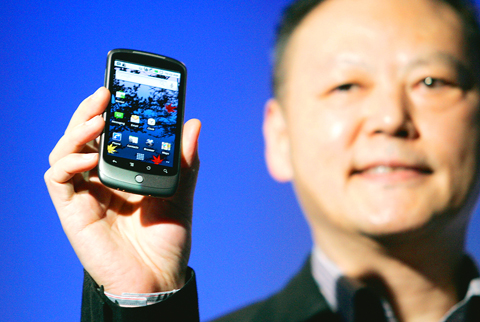HTC Corp (宏達電), the manufacturer of the world’s first phone running Google’s Android system, yesterday posted a 31 percent decline in revenues for the fourth quarter amid rising operating costs.
Last quarter’s net income dropped to NT$5.58 billion (US$175 million), compared with a revised profit of NT$8.09 billion a year earlier, HTC said in a statement. That figure also represented a 2 percent drop quarter-on-quarter.
Revenues dropped 13 percent to NT$41.08 billion in the fourth quarter, from NT$47.38 billion a year ago, meeting the company’s earlier forecast of between NT$40 billion and NT$42 billion.

PHOTO: BLOOMBERG
For the whole year, net profit shrank 21 percent to NT$22.65 billion from NT$28.64 billion in 2008. Revenue fell 5 percent to NT$144.88 billion from NT$152.56 billion in the previous year, said HTC, which is scheduled to give its quarterly outlook during a teleconference with investors on Jan. 26.
“HTC released better-than-expected revenues, but its earnings do not match the pace. This means that the company may spend more on marketing its branded phones than it disclosed,” Lu Chia-lin (呂家霖), who tracks the handset industry for Macquarie Securities, said by telephone yesterday.
In November, Taoyuan-based HTC said it would allocate a bigger share of its revenues — as much as 17.5 percent — to promote its smartphones amid growing competition, compared with 14 percent in the third quarter last year and 11.5 percent in the final quarter of 2008.
New orders from Google Inc and US telecoms operator Verizon Wireless could be the major driving force behind HTC’s strong sales last month, Lu said.
“HTC has began shipping Nexus One to Google last month. We believe the partnership will have a positive impact on HTC, as the gross margin is not bad,” Lu said.
HTC could ship about 2 million Nexus One phones to Google this year as the online search giant seeks to boost sales through a new online shopping service.
Citigroup analyst Kevin Chang (張凱偉), however, was more cautious about Google’s move in the handset sector.
It would be “impossible for HTC to make 30 percent gross margin” with Nexus One, Chang said in a report yesterday.
HTC financial executive officer Cheng Hui-ming (鄭慧明) told Bloomberg yesterday that the phone would have a profit margin similar to that of HTC’s branded devices.
Google’s new phone could cause a severe blow to HTC’s current models, most of which retail for more than US$550. The Google Nexus One is sold for US$529 without telecoms services, or starting at US$179 with a two-year service contract, Chang said.
Shares of HTC inched up 0.4 percent yesterday to NT$373.5, underperforming the benchmark TAIEX, which gained 1.42 percent.

TAKING STOCK: A Taiwanese cookware firm in Vietnam urged customers to assess inventory or place orders early so shipments can reach the US while tariffs are paused Taiwanese businesses in Vietnam are exploring alternatives after the White House imposed a 46 percent import duty on Vietnamese goods, following US President Donald Trump’s announcement of “reciprocal” tariffs on the US’ trading partners. Lo Shih-liang (羅世良), chairman of Brico Industry Co (裕茂工業), a Taiwanese company that manufactures cast iron cookware and stove components in Vietnam, said that more than 40 percent of his business was tied to the US market, describing the constant US policy shifts as an emotional roller coaster. “I work during the day and stay up all night watching the news. I’ve been following US news until 3am

UNCERTAINTY: Innolux activated a stringent supply chain management mechanism, as it did during the COVID-19 pandemic, to ensure optimal inventory levels for customers Flat-panel display makers AUO Corp (友達) and Innolux Corp (群創) yesterday said that about 12 to 20 percent of their display business is at risk of potential US tariffs and that they would relocate production or shipment destinations to mitigate the levies’ effects. US tariffs would have a direct impact of US$200 million on AUO’s revenue, company chairman Paul Peng (彭雙浪) told reporters on the sidelines of the Touch Taiwan trade show in Taipei yesterday. That would make up about 12 percent of the company’s overall revenue. To cope with the tariff uncertainty, AUO plans to allocate its production to manufacturing facilities in

Six years ago, LVMH’s billionaire CEO Bernard Arnault and US President Donald Trump cut the blue ribbon on a factory in rural Texas that would make designer handbags for Louis Vuitton, one of the world’s best-known luxury brands. However, since the high-profile opening, the factory has faced a host of problems limiting production, 11 former Louis Vuitton employees said. The site has consistently ranked among the worst-performing for Louis Vuitton globally, “significantly” underperforming other facilities, said three former Louis Vuitton workers and a senior industry source, who cited internal rankings shared with staff. The plant’s problems — which have not

COLLABORATION: Given Taiwan’s key position in global supply chains, the US firm is discussing strategies with local partners and clients to deal with global uncertainties Advanced Micro Devices Inc (AMD) yesterday said it is meeting with local ecosystem partners, including Taiwan Semiconductor Manufacturing Co (TSMC, 台積電), to discuss strategies, including long-term manufacturing, to navigate uncertainties such as US tariffs, as Taiwan occupies an important position in global supply chains. AMD chief executive officer Lisa Su (蘇姿丰) told reporters that Taiwan is an important part of the chip designer’s ecosystem and she is discussing with partners and customers in Taiwan to forge strong collaborations on different areas during this critical period. AMD has just become the first artificial-intelligence (AI) server chip customer of TSMC to utilize its advanced